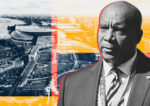The Chicago Bears’ fantastic renderings of a domed lakefront stadium south of Soldier Field haven’t warmed Illinois Gov. J.B. Pritzker to the team’s proposed public financing for a majority of the $3.2 billion plan.
The NFL team wants $900 million in bond funding issued by the Illinois Sports Facilities Authority, as well as $1.5 billion for infrastructure costs, including $325 million up front for construction. But a meeting this week between Bears executives and representatives from the governor’s office didn’t move the needle, Crain’s reported.
“As the governor has said, the current proposal is a nonstarter for the state,” the governor’s press secretary Alex Gough said. “In order to subsidize a brand new stadium for a privately owned sports team, the governor would need to see a demonstrable and tangible benefit for the taxpayers of Illinois.”
The Illinois State Assembly is also unlikely to support the proposal.
Chicago Mayor Brandon Johnson, on the other hand, endorsed the Bears’ proposal last week, praising its plan to use taxpayer funding to renovate the Museum Campus.
“The governor’s office remains open to conversations with the Bears, lawmakers and other stakeholders with the understanding that responsible fiscal stewardship of taxpayer dollars remains the foremost priority,” Gough said.
The Bears want public subsidies, but the organization doesn’t want to share much of the stadium’s leasing revenues with the public. Although the stadium would be owned by the Chicago Park District, the team’s proposal calls for the Bears to keep the vast majority of revenues that the stadium could garner from events like a Super Bowl, college championship games or concerts, as well as advertising and naming rights.
The proposal calls for refinancing $430 million in outstanding Illinois Sports Facilities Authority debt from construction of the White Sox’s Guaranteed Rate Field and 2003 renovations to Soldier Field. And it would create a $160 million reserve to protect taxpayers on the Illinois Sports Facilities Authority’s debt service. An existing 2 percent hotel tax would continue funding the agency’s debt service.
The future cost of the proposed stadium is estimated at nearly $5 billion, accounting for interest.
The Bears’ proposal is “unconscionable,” when “we can’t fully fund domestic violence shelters or sexual assault services, or even fully fund our state facilities,” state Rep. Kelly Cassidy told the outlet. “It’s not a world where we should be subsidizing somebody who’s got plenty of money of their own.”
Research from entities including the Brookings Institution and the Federal Reserve of St. Louis has shown that stadiums don’t financially benefit communities, although they often reap public subsidies, including property tax breaks.
“If they’re thinking that somehow the leadership is going to make magic happen at the eleventh hour, they’re just harkening to a day that is long gone,” said Cassidy, who represents a Chicago district in the general assembly.
—Rachel Stone
Read more



